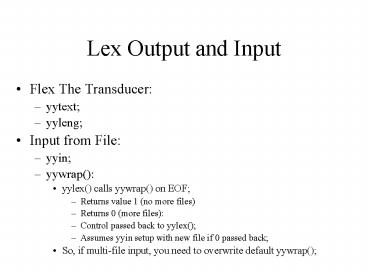Lex Output and Input PowerPoint PPT Presentation
1 / 16
Title: Lex Output and Input
1
Lex Output and Input
- Flex The Transducer
- yytext
- yyleng
- Input from File
- yyin
- yywrap()
- yylex() calls yywrap() on EOF
- Returns value 1 (no more files)
- Returns 0 (more files)
- Control passed back to yylex()
- Assumes yyin setup with new file if 0 passed
back - So, if multi-file input, you need to overwrite
default yywrap()
2
Flex (Multi-)File Input
- main(argc, argv)
- if(argcgt1)
- / open first file and set yyin to that file
(named in argv1) / - yylex( )
- yywrap( )
- / if more files, use argv to set yyin, return
0, prompting yylex( ) / - / if no more files, return 1, prompting end of
scanning /
3
The Symbol Table
- First example listed all words to be recognised
as verbs - Lots of hassle to add new words, and makes lex
file very large - Program language compilers use symbol tables
- Table with words and their type (read in
dynamic?) - noun cat dog mouse
- verb ate hit chased
- Function to add-word to table addWord(int type,
char word) - Function to lookup word int lookUp(char word)
- State to check whether we want addition to table
or analysis - Enumerated type for each type of word
- EnumLOOKUP, VERB, NOUN
4
Rules section
- \n statelookup
- verb stateVERB
- noun stateNOUN
- a-zA-Z
- if(state!LOOKUP) addWord(state, yytext)
- else switch(lookUp(yytext))
- case VERB printf(yytext is verb) break
- case NOUN printf(yytext is noun) break
- default printf(Dont recognise this)
break - . / ignore the rest/
5
User Subroutines Section
- main()
- yylex()
- struct wordchar name, int word_type struct word
next) - struct word word_list // pointer to it
- addWord(type, word)
- look for it in table if found, report
- alternatively, malloc space save type and save
word - int lookUp(word)
- search through list with strcmp()
- if found return word type
6
Running it
- Input (Result in the table being added to)
- verb hit ate chased
- noun cat dog mouse
- Input (token recognition)
- hit ate cat
- mouse chased dog
7
Writing a Basic Parser
- Flex
- Token Identification
- yylex()
- Bison
- Token Structuring
- yyparse()
- Communication
- yyparse() called by main routine
- Calls yylex() expecting next token
- yylex() returns next token
- Passing control back to yyparse() with the token
- Implies Common understanding of Tokens
8
Description of .y file
- Definition Section
- Literal Code Block
- Definitions
- All TOKENS expected from yylex( )
- Any valid C identifier can be used but convention
is UPPERCASE - Rules Section
- Production Rules
- Action undertaken
- Position of Start Symbol
- Code Section
- main()
- Current Parse over on TOKEN zero
- Repeatedly calls yyparse()
- yyerror()
- When Impossible to Structure
9
Minimal Parser .y file
- / Limited sentence recogniser /
- includeltstdio.hgt
- token NOUN VERB ARTICLE
- sentence ARTICLE NOUN VERB ARTICLE NOUN
- printf(Is a valid Sentence!\n)
- extern FILE yyin
- main()
- do yyparse()
- while(!feof(yyin))
- yyerror(char s)
- fprintf(stderr, s\n, s)
10
Minimal Parser (.l file)
- / this demonstrates (very) simple recognition of
a sentence / - include y.tab.h /token defn.s from the
parser/ - \t / ignore whitespace /
- cat
- dog
- mouse return(NOUN)
- ate
- hit return(VERB)
- the
- a return(ARTICLE)
- a-zA-Z
- . / ignore any other characters /
11
Minimal Parser .y file
- / Limited sentence recogniser /
- includeltstdio.hgt
- token NOUN VERB ADJECTIVE ARTICLE
- sentence ARTICLE nounphrase VERB ARTICLE
nounphrase - printf(Is a valid Sentence!\n)
- nounphrase NOUN adjectives NOUN
- adjectives ADJECTIVE ADJECTIVE adjectives
- main()
- / as before /
- yyerror(char s)
- / as before /
12
Getting It Working
- flex eg2.l (presume lex file is eg2.l)
- bison d eg2.y (presume yacc file is eg2.y)
- cc c lex.yy.c eg2.tab.c
- cc o example lex.yy.o eg2.tab.o ll
- example
- Type in sentences!
13
Symbol Values / Actions
- Every Terminal Symbol has a Value
- NOUN could be cat, mouse or dog depending
on language instance. - Every VN has a value you assign to it
- The C code you enter forms it
- Expression NUMBER NUMBER 13
- NUMBER - NUMBER 1-2
- This can happen because of default int type
- Usually not so lucky!
- Different Symbols Different Types
- YYSTYPE union typedef created by BISON to
contain them - YYSTYPE used in y.tab.h for Token Definitions
14
Yacc Symbol Types (.y file)
- Double vbltable26
- union double dval
- int ival
- token ltivalgt NAME
- token ltdvalgt NUMBER
- type ltdvalgt exp
- statement NAME exp vblt1 3
- exp printf(g\n, 1)
- exp exp exp 1 3
- exp - exp 1 - 2
- NUMBER 1
- NAME vblt1
15
y.tab.h file Generated
- define NAME 257
- define NUMBER 258
- typedef union
- double dval
- int ival
- YYSTYPE
- Extern YYSTYPE yylval
16
.l file associated
- include y.tab.h
- include ltmath.hgt
- extern double vblt26
- 0-9(0-9\.0-9) yylval.dvalatof(yytext)
- return NUMBER
- \t / ignore /
- a-z yylval.ivalyytext0-a
- return NAME
- etc.

